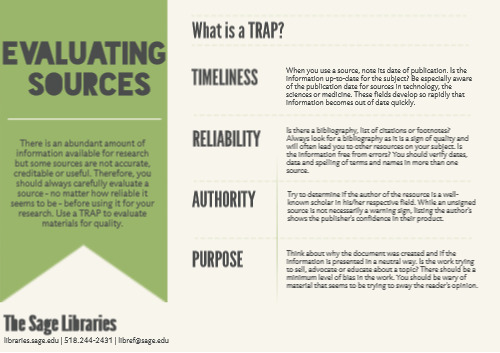Librarian

Chris White
Office: Troy Library
Email: [email protected]
Phone: (518)244-4521
Ask A Librarian
|
|
In person: |
|
By phone: (518) 244-2431 |
|
|
|
By email: |
|
|
By online chat: |
|
|
Schedule an appointment with a Research Librarian |
Keyword Search Tips
Consider adding one of these terms to your search terms: smooth shading, cross-hatching, internal lines, linear style.- Break down your topic into smaller concepts and identify synonyms for those concepts.
- Use "AND" to combine terms in your search, i.e. "wax casting and stone carving"
- Use "OR" to expand your results, i.e. "modelling in clay or wood carving"
- Use QUOTATION MARKS to delineate a group of words as a phrase, i.e. "lyrical abstraction"
- For more search tips, see one of these tutorials:
Find Background Information
Almanacs, dictionaries and encyclopedias are often a good starting point in the research process as they provide background information on a topic. They can also be used to identify key people, events and dates that can be used to find additional information on a topic. Try one of these online reference sources when searching for background information:
Credo Reference
An online reference library containing dictionaries, encyclopedias, thesauri, books of quotations and atlases. Credo Reference also offers a range of subject-specific reference books.
Gale Virtual Reference Library
Reference books in a database format. The sources include multi-volume encyclopedias in history, social sciences and more.
Find Journal Articles
Many of these databases, provide full text coverage. You will often see links that you can click on to connect directly to an article. Look for "PDF Full Text," "HTML Full Text" or "Linked Full Text" somewhere on the page. Examples are below:


 The Find Full Text symbol indicates that Sage may own the material, but it is housed in a different database or journal. Clicking this link will bring you to the article in full text, if owned by Sage.
The Find Full Text symbol indicates that Sage may own the material, but it is housed in a different database or journal. Clicking this link will bring you to the article in full text, if owned by Sage.If full text access is NOT available through the Sage databases, you may request the journal article via Interlibrary Loan (ILL).
Browsing Biology Books
The Sage Libraries uses the Library of Congress Classification (LCC) system to organize its book collection. The majority of biology books can be found in the following sections:| GC | Oceanography | |
| GE | Environmental Sciences | |
| GF | Human Ecology | |
| Q | Science (General) | |
| QH | Natural History - Biology | |
| QK | Botany | |
| QL | Zoology | |
| QM | Human anatomy | |
| QP | Physiology | |
| QR | Microbiology | |
| R | Medicine | |
| S | Agriculture | |
| SB |
|
|
| SD | Forestry | |
| SF | Animal culture | |
| SH | Aquaculture | |
| TD | Environmental technology |
Evaluating Sources
There are numerous websites and blogs available on the internet but some may not be accurate, creditable or useful. Therefore, you should always carefully evaluate a source - no matter how reliable it seems to be - before using it for your research. Use a TRAP to evaluate materials for quality.
Citing Sources
General Online Guides
Purdue Online Writing LabCopies of the major style manuals can be found at the Information Desk in either Library.
Citation Management Software
Citation management software is designed to help you store, organize, and cite your research. Most of the available citation management tools will help you store and organize your sources in one place, share sources with other researchers, read and annotate PDFs, insert formatted citations and bibliographies into word processing software.RefWorks
All Sage students, faculty, and staff have access to RefWorks citation manager, free of charge through the Sage Library. Click here to set up a free account with your sage.edu email address. For more help with Refworks, click here.
Quick links to other popular citation managers:
- Mendeley (free)
- Zotero (free)
- EndNote
- EndNote Basic (free version)
Getting Started
- To search for BACKGROUND information, use Credo Reference.
- To search for BOOKS and DVDS, start wtih WorldCat.
- To search for JOURNAL ARTICLES, start with Academic Search Elite , ProQuest Biology or Science Direct. For other relevant sources, see list of All Items by Source below.
- To gain a better understanding of RESEARCH METHODS, see SAGE Research Methods Video Collection. which contains more than 125 hours of video, including tutorials, case study videos, expert interviews, and more -- covering the entire research methods and statistics curriculum.
New York Times
If you have not done so, create a NY Times account here. Subscription provided free to all Russell Sage College students, staff, and faculty.
- Today's Edition -- Login here.
- 1980 - PRESENT -- Click here.
- 1851 - 2002 -- Login to NY Times and then open the TimesMachine here.
- Faculty may also want to register to access the NYT in Education website, which provides educators with classroom resources such as discussion questions and co-curricular activities related to news stories.
Quick Search
Quick Search will search all journal article databases at once. To make use of interlibrary loan, enter your search; on the results page, click "Add results beyond your library's collection."

Quick Search will search all journal article databases at once. To make use of interlibrary loan, enter your search; on the results page, click "Add results beyond your library's collection."
Credo Reference
An online reference library containing dictionaries, encyclopedias, thesauri, books of quotations and atlases. Credo Reference also offers a range of subject-specific reference books.
An online reference library containing dictionaries, encyclopedias, thesauri, books of quotations and atlases. Credo Reference also offers a range of subject-specific reference books.
Article Databases Specific to Discipline
Sage Journal Portal - Health & Biological Sciences
Access to thousands of online journals, magazines and newspapers covering Health and Biological Sciences.
Access to thousands of online journals, magazines and newspapers covering Health and Biological Sciences.
Science Direct
A collection of scholarly journals covering science, technology, medicine, social sciences and humanities.
A collection of scholarly journals covering science, technology, medicine, social sciences and humanities.
Article Databases in Related Disciplines
Medline
Produced by the National Library of Medicine, MEDLINE provides authoritative medical information on medicine, nursing, the health care system, pre-clinical sciences and more.
Produced by the National Library of Medicine, MEDLINE provides authoritative medical information on medicine, nursing, the health care system, pre-clinical sciences and more.
PubMed
The search service for the National Library of Medicine and the National Institutes of Health.
The search service for the National Library of Medicine and the National Institutes of Health.
Article Databases Multidisciplinary
Academic Onefile
A multi-disciplinary database containing thousands of journals and reference sources
A multi-disciplinary database containing thousands of journals and reference sources
Academic Search Elite
Provides full text for more than 2,100 journals, including more than 1,700 peer-reviewed titles. It covers a wide variety of topics including computer sciences, engineering, physics, chemistry, language and linguistics, arts & literature, history, and ethnic studies.
Provides full text for more than 2,100 journals, including more than 1,700 peer-reviewed titles. It covers a wide variety of topics including computer sciences, engineering, physics, chemistry, language and linguistics, arts & literature, history, and ethnic studies.
Google Scholar
Not to be confused with regular (and unreliable) Google. Google Scholar is a freely accessible web search engine that indexes the full text or metadata of scholarly literature across an array of publishing formats and disciplines.
Not to be confused with regular (and unreliable) Google. Google Scholar is a freely accessible web search engine that indexes the full text or metadata of scholarly literature across an array of publishing formats and disciplines.
- Make use of the powerful "Cited By" feature.
- For Interlibrary Loan, click on >> icons.
QuickSearch
Quick Search will search all journal article databases at once. To make use of interlibrary loan, enter your search; on the results page, click "Add results beyond your library's collection."

Quick Search will search all journal article databases at once. To make use of interlibrary loan, enter your search; on the results page, click "Add results beyond your library's collection."
Almanacs, dictionaries and encyclopedias are often a good starting point in the research process as they provide background information on a topic. They can also be used to identify key people, events and dates that can be used to find additional information on a topic. Try one of these online reference sources when searching for background information:
Credo Reference
An online reference library containing dictionaries, encyclopedias, thesauri, books of quotations and atlases. Credo Reference also offers a range of subject-specific reference books.
Gale Virtual Reference Library
Reference books in a database format. The sources include multi-volume encyclopedias in history, social sciences and more.
Credo Reference
An online reference library containing dictionaries, encyclopedias, thesauri, books of quotations and atlases. Credo Reference also offers a range of subject-specific reference books.
Gale Virtual Reference Library
Reference books in a database format. The sources include multi-volume encyclopedias in history, social sciences and more.

